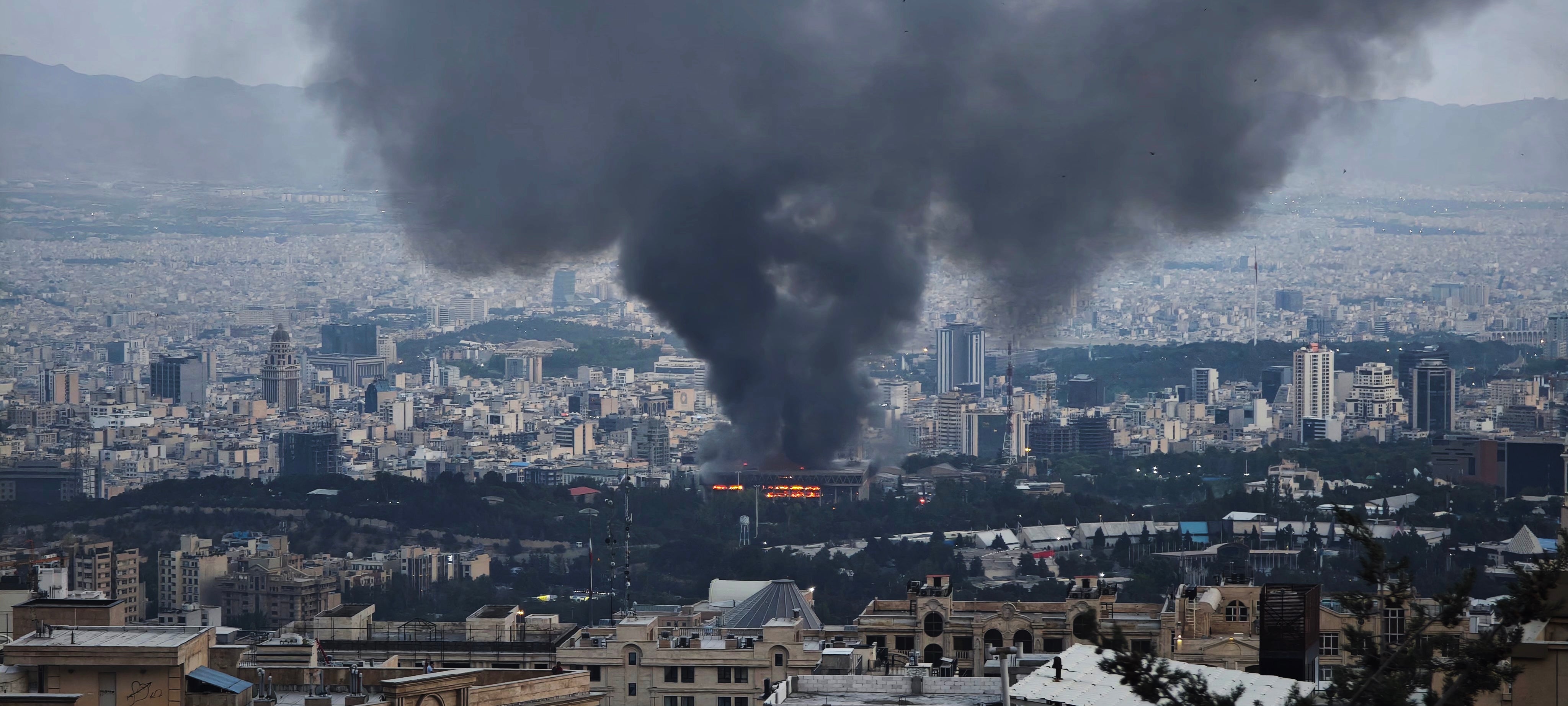Hundreds of thousands of people in Tehran were warned by Israel to evacuate on Monday as it launched fresh strikes on Iran, including one that hit the country’s state TV station during a live broadcast.
Four days after Israel launched the largest attack on Iran since the 1980s, in a bid to eradicate Tehran’s nuclear programme, the two foes continued to trade missile fire – with civilian casualties continuing to mount in the unprecedented conflict.
Live footage showed anchor Sahar Emami briefly fleeing the studio as the offices of Iranian state broadcaster Irib were attacked, rocking the building and causing visible debris to fall in front of the camera.
Clips published from across the street showed several fires burning in the building and a large plume of smoke billowing into the sky.

Just prior to the attack, Israel’s defence minister Israel Katz had said that “the Iranian propaganda and incitement mouthpiece is on its way to disappearing”, after Israel’s military issued an evacuation notice covering much of Tehran’s District 3.
According to the Associated Press, the warning affected up to 330,000 people in a part of central Tehran housing Iran’s state TV and police headquarters, international embassies, and three large hospitals, including one owned by Iran’s Revolutionary Guard.
With concerns over the conflict set to dominate the agenda at the G7 summit in Canada, Israel’s allies were expected to urge de-escalation.
But reports, citing US officials, suggested Donald Trump intended not to sign a G7 document, the draft of which reportedly called for both Iran and Israel to protect civilians and urged commitments to peace.
From the outset of its fourth day, the conflict showed no signs of slowing. Iranian missiles struck Tel Aviv and the port city of Haifa shortly before dawn on Monday, killing at least eight people and wounding more than 100 others. Homes were destroyed close to the US embassy, which officials said suffered minor damage.

While Iran claimed to have employed a new method allowing its projectiles to better evade Israel’s air defences, Israel insisted that just seven out of fewer than 100 missiles fired by Iran overnight had landed in its territory.
Following the attack on Iran’s state broadcaster and an alleged attack on Farabi Hospital in the city of Kermanshah, Iranian state media claimed that Tehran was preparing for the “largest and most intense missile attack” in history on Israeli soil.
So far, at least 224 people have been killed in Iran, while 24 people have been killed in Israel and more than 500 injured, officials said, although rights groups warned the death toll in Iran was likely far higher.
Germany announced it would start evacuating its citizens from Israel via Jordan, with a charter flight planned for Wednesday. Sir Keir Starmer said UK citizens should “register their presence” on a portal which was due to be launched.
Israel’s president Isaac Herzog doubled down on Monday over claims that his country had “no other choice” but to attack Iran because it was proceeding “dramatically” towards building a nuclear bomb, telling Sky News: “We have to remove the Iranian nuclear programme because we see the negotiating process as being futile because they are lying whilst talking to us.”
While sources told Reuters that US intelligence continued to indicate that Iran was not building a nuclear weapon, Israel’s attack came days after the UN’s International Atomic Energy Agency accused Iran of breaching its non-proliferation obligations and warned that Tehran had enough uranium enriched to near-weapons grade to make nine nuclear bombs.
Having declared on Monday that Israel had achieved air superiority above Tehran, the country’s prime minister, Benjamin Netanyahu, told Israeli troops at an air base that Israel was on its way to achieving its two main aims – wiping out Iran’s nuclear programme and destroying its missiles.
“We are on the path to victory,” he said. “We are telling the citizens of Tehran ‘evacuate’ and we are taking action.”
Sources told Reuters that Tehran had asked Qatar, Saudi Arabia and Oman to press Mr Trump to use his influence on Israel to agree to an immediate ceasefire. In return, Iran would show flexibility in nuclear negotiations, it was claimed.
Echoing these claims, Iran’s foreign minister, Abbas Araqchi, said on social media: “If President Trump is genuine about diplomacy and interested in stopping this war, next steps are consequential.
“Israel must halt its aggression, and absent a total cessation of military aggression against us, our responses will continue. It takes one phone call from Washington to muzzle someone like Netanyahu. That may pave the way for a return to diplomacy.”
Speaking to reporters at the G7 meeting, Mr Trump said: “I’d say Iran is not winning this war, and they should talk, and they should talk immediately before it’s too late.”
Additional reporting by AP
Ukraine war live: Putin accused of ‘pure terrorism’ after devastating attack on Kyiv
Business news live: FTSE 100 opens after UK-US trade deal is signed
The world’s most trafficked mammal on ‘razor’s edge of extinction’
Iran-Israel latest: Trump says G7 exit nothing to do with ceasefire
US sends second aircraft carrier to Middle East as Israel-Iran conflict grows
Fears Trump will veto G7 joint statement on Russia sanctions and Israel







